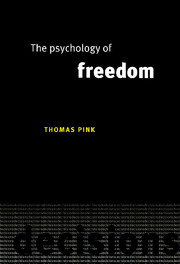Book contents
- Frontmatter
- Contents
- Acknowledgments
- Introduction
- 1 Agency and the will
- 2 Scepticism about second-order agency
- 3 Decision-making and freedom
- 4 The Psychologising conception of freedom
- 5 Decision rationality and action rationality
- 6 Decision-making and Teleology
- 7 The Regress argument
- 8 In defence of the Action model
- 9 The special-purpose agency of the will
- Conclusion
- Bibliography
- Index
2 - Scepticism about second-order agency
Published online by Cambridge University Press: 31 August 2009
- Frontmatter
- Contents
- Acknowledgments
- Introduction
- 1 Agency and the will
- 2 Scepticism about second-order agency
- 3 Decision-making and freedom
- 4 The Psychologising conception of freedom
- 5 Decision rationality and action rationality
- 6 Decision-making and Teleology
- 7 The Regress argument
- 8 In defence of the Action model
- 9 The special-purpose agency of the will
- Conclusion
- Bibliography
- Index
Summary
THE REDUCTION ARGUMENT
We ordinarily assume that we do have a freedom to decide otherwise – that which actions we decide to perform is within our control – and that, therefore, taking a particular decision to act is as much something which we deliberately do as is the action which that decision explains. We believe that we have a capacity for second-order agency.
But philosophers have often denied that second-order agency occurs at all. Hobbes was a pioneer sceptic. His scepticism about second-order agency, we have seen, was part of a more general scepticism about the existence of intentions and practical judgments as action explanatory attitudes distinct from desire. Hobbes denied that there was any special psychology required for rational or free agency. What separates us humans as agents from desire-possessing sharks and mice, is not our possession of quite new kinds of psychological attitude which those animals lack – but merely the fact that our desires have far more complex and varied contents.
We can extract from Hobbes' psychology of action the following Reduction argument both against second-order agency and freedom of the will.
Ignoring cases where we affect which desires we form through doing something else first – as when we go for a walk to work up an appetite – we seem to lack control over our desires. Desire formation seems to be passive rather than active.
- Type
- Chapter
- Information
- The Psychology of Freedom , pp. 33 - 63Publisher: Cambridge University PressPrint publication year: 1996



